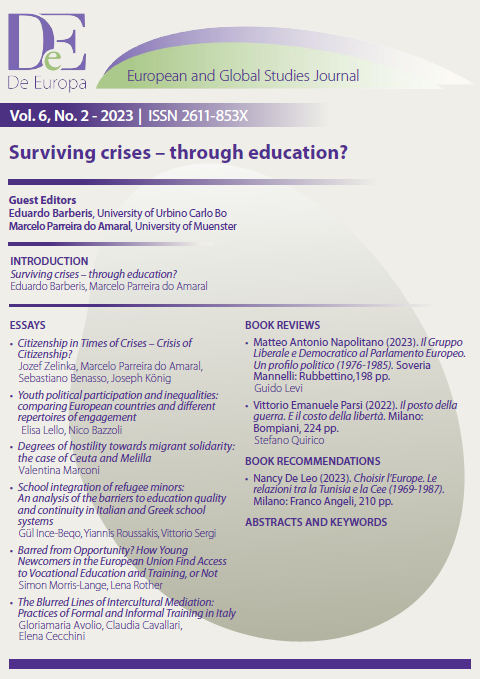Degrees of hostility towards migrant solidarity: the case of Ceuta and Melilla
DOI:
https://doi.org/10.13135/2611-853X/7086Abstract
While European borders have increasingly hardened and proliferated since the so-called 2015 refugee crisis, practices of migrant assistance and solidarity by civil society actors have become a feature of contemporary border politics. On the one hand, across the European Union, local and international initiatives have often responded to needs of newcomers, by playing a pivotal role in doing humanitarian work; on the other hand, both organisations and individuals engaged in migrant solidarity and assistance have become the target of policies and practices of criminalisation. My analysis takes the Spanish enclaves of Ceuta and Melilla as a case-study, drawing on data collected during a 2019-2020 fieldwork. The paper argues that in the Spanish enclaves’ local humanitarians belonging to a range of civil society actors face different forms of intimidation and indirect pressure, both by governmental and non-governmental actors. I show how the lack of acceptance
of the work of local humanitarians among some sectors of the local population lies with feelings of ‘fear’ and rejection towards some specific groups of migrants, such as unaccompanied minors from Morocco and young male migrants from Sub-Saharan countries. In addition, I describe how, along this EU external border, cases of harsher forms of criminalisation have been recorded as well. The paper concludes that tensions and hurdles that local humanitarians face in these EU border localities partially reflect a broader European trend and are a ‘sub-product’ of larger process of criminalisation of migrants and refugees travelling through ‘irregular’ routes.
Keywords: Humanitarian border, Migrant solidarity, Civil society organisations, Ceuta, Melilla, Criminalisation




 The journal has been approved for inclusion in DOAJ. The DOAJ listing of the journal is available at
The journal has been approved for inclusion in DOAJ. The DOAJ listing of the journal is available at 

